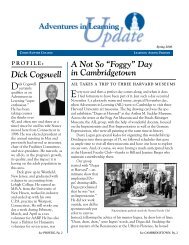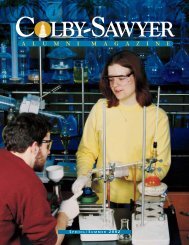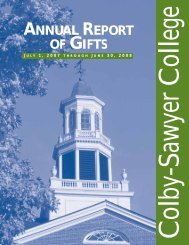A L U M N I M A G A Z I N E - Colby-Sawyer College
A L U M N I M A G A Z I N E - Colby-Sawyer College
A L U M N I M A G A Z I N E - Colby-Sawyer College
You also want an ePaper? Increase the reach of your titles
YUMPU automatically turns print PDFs into web optimized ePapers that Google loves.
Malaysia in the summer of 2011. This<br />
project, which utilized survey research<br />
and interviews to investigate the meaning<br />
of democracy in Malaysia, is based upon<br />
Shu Wen’s experiences in two <strong>Colby</strong>-<br />
<strong>Sawyer</strong> classes: the Honors “Citizen<br />
Leader” Pathway and Introduction to<br />
Comparative Government.<br />
These projects reveal the ways in<br />
which the Idea Fund advances the<br />
Wesson Honors Program’s academic mission. The process of<br />
constructing, articulating and undertaking an Idea Fund project<br />
pushes students to apply what they learn in the classroom,<br />
break down disciplinary walls and become critical thinkers in<br />
their everyday life.<br />
While many Idea Fund proposals probe questions and<br />
themes that arose in classes, the program also encourages students<br />
to test-drive their own theories. During the summer of<br />
2010, Business Administration major Chao Lu ’13 conducted<br />
a study that tracked the decisions of hedge fund managers and<br />
linked these decisions to both macro and micro economic performance.<br />
This project, which required a very small budget to<br />
purchase resources and access to key databases, allowed Chao to<br />
explore the complex relationship between truth, rationality and<br />
success in the world of economics. His conclusion, that “what is<br />
true is not always successful,” presents an intriguing challenge<br />
to the assumptions of classical economic theory.<br />
Another example of a student utilizing an Idea Fund grant<br />
to explore a hypothesis is Pengziang Ding ’14, who this summer<br />
examined a thought-provoking theory about the emerging<br />
relationship between China and the United States. Pengziang<br />
proposed that the high levels of knowledge and interest in the<br />
United States and its systems among Chinese students is not<br />
matched by similar levels of knowledge and interest in China<br />
among American students. His project, which collected survey<br />
responses to be analyzed and interpreted, will spark campus-<br />
Echo Wang (center on horseback) prepares to go riding in a province of China formerly known as Tibet.<br />
40 COLBY-SAWYER ALUMNI MAGAZINE<br />
A panel of <strong>Colby</strong>-<strong>Sawyer</strong> students, along with Professor Eric Boyer (center), participated in a discussion titled<br />
“One Tibet: Many Meanings” during International Education Week in November 2010. The panel included<br />
(from left): Yujia “Echo” Wang (China), Kylie Dally (U.S.), Professor Boyer, Abhiyan Thapliya (Nepal), Harinder<br />
Singh (India) and Tenzin Tsephel (Tibet), and Professor of Business Administration Eva Szalvai (not shown).<br />
wide discussions about the emerging political, economic and<br />
social ties that bind China with the United States.<br />
In challenging students to utilize the guideposts of their<br />
classroom experiences to chart their own academic paths,<br />
the Idea Fund fuels the intellectual curiosity, experience and<br />
confidence necessary to seek out new opportunities. Idea Fund<br />
recipients build research projects that send them out into the<br />
world, and in turn bring their conclusions and theories back to<br />
the classroom.<br />
Few undergraduates are given opportunities to pursue their<br />
own research, and the skills that this process demands will<br />
easily transfer to future endeavors. Idea Fund grants push our<br />
honors students to develop their intellectual curiosity, and<br />
when combined with experience and confidence, curiosity is a<br />
powerful recipe for success in applications for competitive fellowships,<br />
admission to graduate school, and employment.<br />
While the benefits most clearly accrue to the individual<br />
grant recipients, the community benefits from their experiences<br />
in a number of ways. In sharing their projects with the campus<br />
community in and outside the classroom, idea grant recipients<br />
share their research and connections with the world, fostering<br />
an infectious excitement for learning on campus.<br />
Idea Fund projects are international in a way that mirrors<br />
the strong international component of the Wesson Honors<br />
Program. Idea Fund research has taken place throughout<br />
the United States and in China, India, Nepal, Ghana, Spain<br />
or some other pop-culture icon, that China<br />
was an overwhelming power of evil whose<br />
reign of terror over the Tibetan people<br />
must be stopped. After actually talking<br />
to people in China about Tibet, however,<br />
I was forced to question this idea. One<br />
Chinese man drew parallels between the<br />
Chinese conquests of Tibetan land with the<br />
European conquests of Native American<br />
land. These were the kinds of conversations<br />
I was able to bring home with me.<br />
One moment stands out beyond all<br />
others as an indication of the success of our<br />
project. When Echo and I returned to campus,<br />
we worked with our advisor, Assistant<br />
Professor of Social Sciences and Education<br />
PHOTO: Ed Germar









